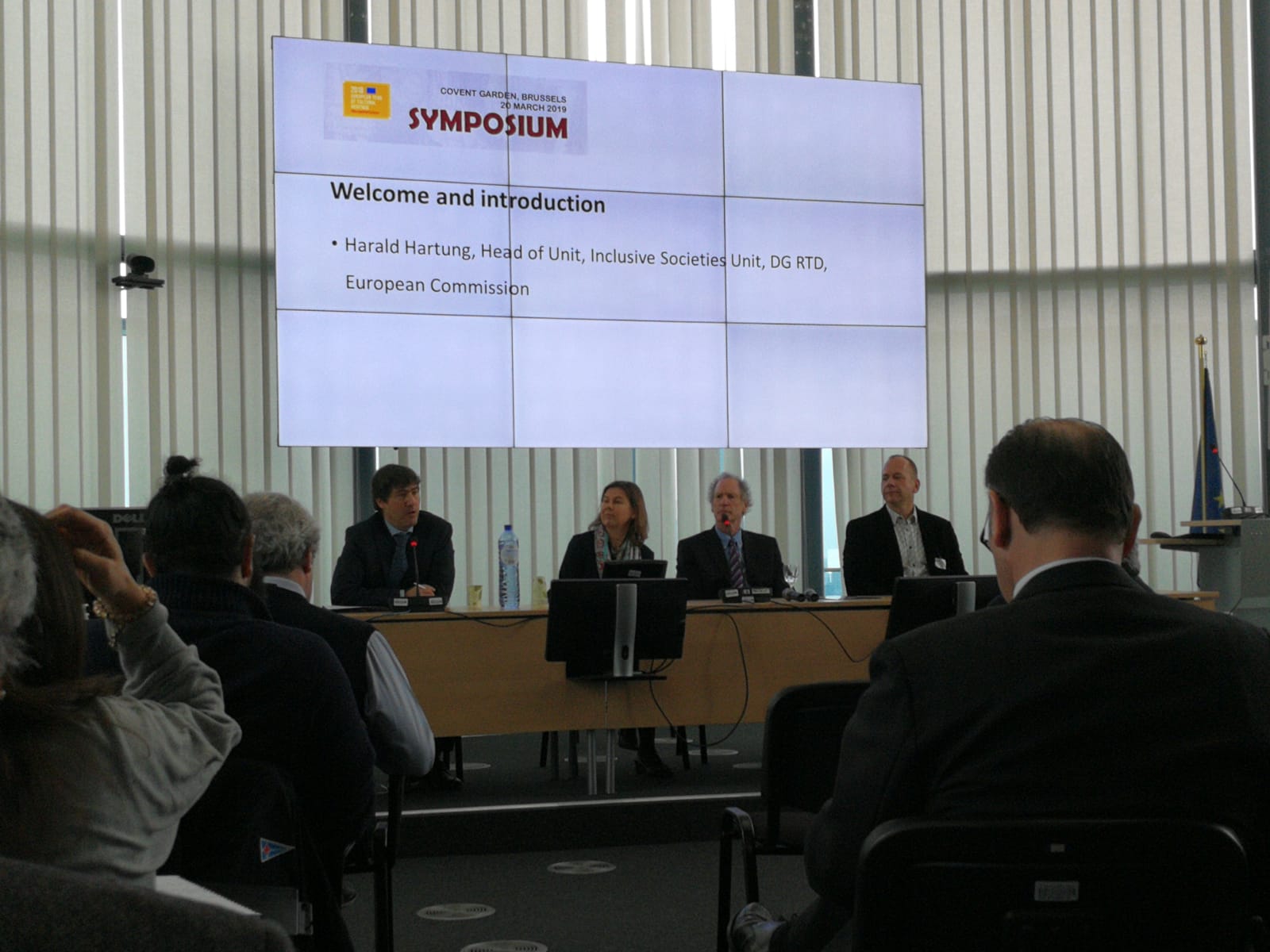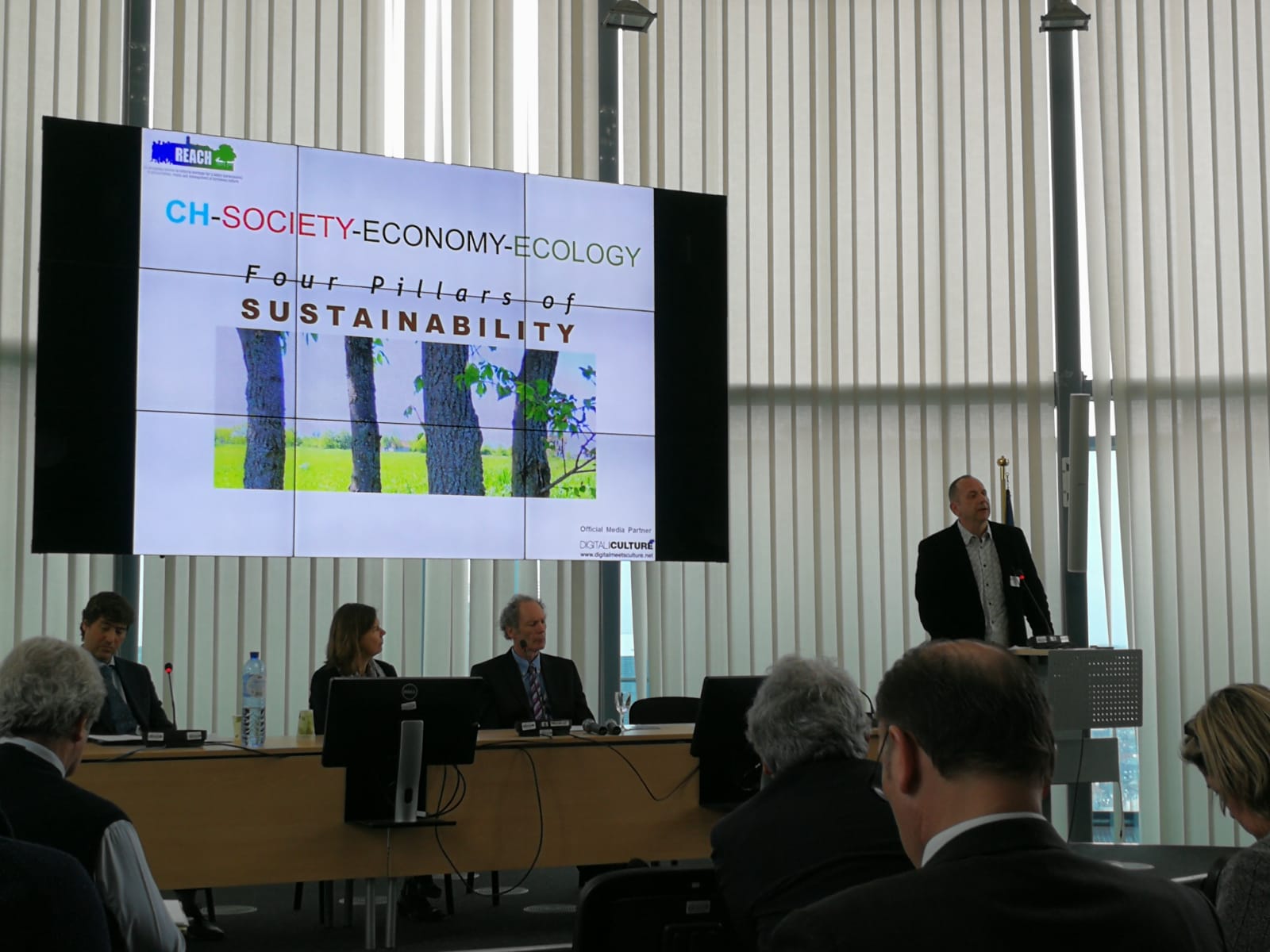|
Digital meets Culture https://www.digitalmeetsculture.net/article/great-participation-and-remarkable-outcomes-for-reach-symposium/ Export date: Mon Mar 31 22:52:43 2025 / +0000 GMT |
Great participation and remarkable outcomes for CH Symposium! The latest successful Symposium of REACH Social Platform was joined by a great number of international professionals engaged in the field of cultural heritage. The event titled “Horizons for Heritage Research - Towards a Cluster on Cultural Heritage", took place the 20th of March, in Brussels and was followed by a second day of Policy Debate meeting which contributed to complete the objectives and reflections of the event. The latest successful Symposium of REACH Social Platform was joined by a great number of international professionals engaged in the field of cultural heritage. The event titled “Horizons for Heritage Research - Towards a Cluster on Cultural Heritage", took place the 20th of March, in Brussels and was followed by a second day of Policy Debate meeting which contributed to complete the objectives and reflections of the event.Mr Harald Hartung (DG RTD, European Commission) welcomed the participants and after a brief introduction, left the floor to Dr. Zoltán Krasznai (Policy officer, European Commission) who opened the first Session “setting the scene” of the symposium and the REACH project. Then it was the turn of Ms Dorota Nigge, (DG EAC, European Commission, Team Leader EYCH) who clearly outlined the legacy of the European Year of Cultural Heritage considering holistic, integrated and participatory approaches to revealing impact. Prof. Neil Forbes (Coventry University) continued to look towards the future by discussing the context of the REACH research in the cultural heritage domain, the reason of the meeting and expected results. Prof. Gábor Sonkoly (ELTE University) concluded this first session with research questions and expectations around EU_H2020. He opened the reflection by asking: “ Why is cultural heritage so important? What are your thoughts?” and inviting participants to leave comments and views. During Session number two delegates were split into groups and a discussion was opened about the benefits of a stable coordination.  Four tables were set up each one developing a specific topic: Four tables were set up each one developing a specific topic:1. Structute, chaired by Prof. Arturo Julio Rodriguez Morato (University of Barcelona) The table discussed on the keys for establishing an effective coordinating structure in the field of cultural heritage research. Participants agreed on the importance of this structure to be sustainable. On this regard they talked about the need to counting on both public and private funds coming from different sources. Additionally, some acknowledgement from the European Commission seemed strategically important in order to achieve a good level of participation. Moreover, a cooperative and adaptive governance of the new structure seemed a necessary requirement too. Therefore, it was said that a steering committee with rotating responsible could be combined with an ample set of "ambassadors" able to link with different national fields. 2. Liaisons and links with existing groups and networks, chaired by Dr. Antonella Fresa, (Promoter S.r.l.) Numerous representatives of several CH networks participated in the round table discussion. It was agreed clearly among the attendees that the coordination structure under discussion is needed and can be beneficial to the whole CH research community. Naturally, any new plan should take advantage of all the associations, groups and initiatives that already exist in specific domains, establish liaisons, and give them visibility. The Symposium has been considered a very helpful opportunity to meet among these networks and to progress in the direction of future joint actions. 3. Who is the audience: scholars, sciences, memory institutions, education, chaired by Prof. Neil Forbes, (Coventry University). In this table the participants discussed model sustainability and what keeps project's alive. In addition, they explored researchers and their positions of power, gatekeepers, beneficiaries and the incentives for contributing, which touched on ethics and the concept of belonging. 4. Relationship with projects and EU programmes, Chaired by Prof. Gábor Sonkoly (ELTE University). There were four main points in the discussion about this topic: 1. The sustainability of the projects and those of the project outcomes is a key challenge. 2. The funding for CH research should be enhanced to obtain more relevant results. 3. CH Science deserves its funding and recognition in EU programmes as a separate domain. CH research has been dispersed in a great variety of programmes and calls. 4. European CH research is eminent and exemplary in the world. It should be used as an asset towards the associated countries and the partner countries. The evening started with the Third Session “Towards Horizon Europe” opened by Prof. Luda Klusakova's intervention (Charles University) about “Expectations from the cultural heritage sectors” Then 5 minute position followed talks from: - JPI CH, Mr Pascal Lievaux (Chair of JPI CH, Ministry of Culture, France) -Europa Nostra, Ms Sneška Quaedvlieg-Mihailović (Secretary General Europa Nostra) -Museums sector, Prof. Monika Hagedorn-Saupe (SPK) -Digital cultural heritage sector, Dr. Johan Oomen (Sound&Vision Foundation, Europeana Board Member) shared a snippet from a video showing a digital CH project between ING_news and Rijksmuseum on recreating Rembrandt's voice.  The delegates split in 4 groups again, to carry on the discussion around 4 more themes: The delegates split in 4 groups again, to carry on the discussion around 4 more themes:1. Conservation, Chair: Prof. Piero Baglioni (University of Florence, ECHOES Cluster) highlighted what are the necessary and effective strategies to ensure the long-term conservation of cultural heritage resources, starting from the three pillars on which heritage conservation is based: diagnosis, treatment, prevention. The ultimate goal is to keep the works of art conserved and accessible. 2. Cultural landscapes, Chair: Prof. Jose Maria Civantos (University of Granada). He reflected on cultural landscape discussions, including relationships between different spheres, roles of different communities, participation and sustainability. 3. Intangible cultural heritage, Chair: Prof. Sandra Bitusikova (Matej Bell University) Co-chair Gábor Olah (ELTE) began sharing discussion points about why we need intangible CH research separated from tangible CH and the role of scholars. Following this, Prof. Alexandra Bitusikowa discussed the importance of considering intangible CH even when working materials. 4. Digital cultural heritage. Chair: Mr Albert Gauthier (DG CNECT, European Commission) summarised discussions around digital CH: digitisation process, quality, copyright management, object annotation, storage and preservation In the last session, Prof. Neil Forbes presented a proposal for the Manifesto, based on the results of the consultation carried out in the previous months. The Symposium ended with the interventions of Mr Harald Hartung and of Dr. Zoltan Krasznai who reflected upon discussions emerged from the event. The participation and engagement of the presents was decisive for the success of the symposium and settled the conditions for future debates on a coordination able to combine resources and intensify the results of each research. |